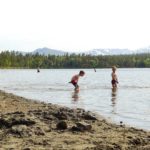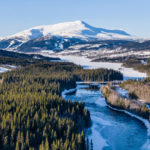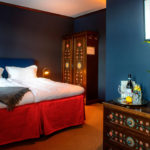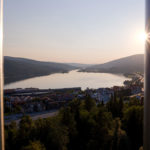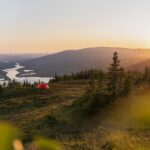Photo: Anette Andersson
How to be a Responsible Visitor in Nature
Be a responsible visitor in nature! The Swedish Right to Public Access law is a luxurious and unique right to access nature, to pluck berries and mushrooms, set up tents and light campfires in the wild. But with rights come responsibility. Below, we have listed some advice for how to be a good visitor when you’re out enjoying everything nature has to offer.
It’s a well-known fact that our well-being improves when we spend time in nature. Fantastic views, the smell of vegetation and even seeing animals in the wild make our shoulders drop and stress is reduced. It’s no wonder an increasing number of people want to enjoy the outdoors. However, an increasing number of people puts more pressure on nature in different ways, by littering, wear and tear and disturbance of the wildlife. Therefore, it’s important to know how to be a good visitor in nature. Here are some tips and advice.
Pack and eat both smart and tasty
Most things taste better when you eat them outside, and you can pack a delicious lunch bag without bringing a lot of unnecessary rubbish with you. Think ahead when at the grocery store while deciding what you’ll need to eat outdoors. Be prepared and pack your food in reusable boxes, jars, and bottles that you can take home afterwards and avoid carrying unnecessary rubbish with you. Stay away from portion-packed snacks and drinks if you don’t want to carry sticky packaging home again. Cutlery, cups, and dishes are available to buy in wood, light metal or plastics that are easy to carry and can be washed and re-used many times. Always bring an extra bag for your rubbish so you you can stow away even the sticky stuff without messing up your backpack.
Bring everything you brought back with you
Littering can severely damage nature as debris such as plastics emit harmful substances for many years which impacts vegetation, water and wildlife. Animals can be harmed by eating litter which can actually cause suffocation, digestive issues and even starvation. For example, plastic bags and cigarette butts can emit toxic substances for hundreds of years. Also, it doesn’t look very nice. So, you can really make a difference by following the advice below.
☘️ Bring an extra litter bag to pack your rubbish in and take home with you – if you carried it up with you, it should be no problem carrying it back down.
☘️ Did you forget to bring a bag for your rubbish? You can find bag dispensers at the trail centres just for this occasion.
☘️ Did you find other people’s rubbish while on your excursion? Do everyone a favour and take it back to a trash can. Rubbish breeds rubbish, let’s continue to take care of nature together. Take care not to forget or lose anything as you go.
☘️ Do you smoke or use snus? Bring something to put your butts / used snus in and throw it away where it belongs – in the trash.
☘️ Both humans and pets have a natural need to go to the bathroom. If there are no toilets near where you are, choose a secluded place while outdoors where others do not risk stepping on. Stay away from watercourses and avoid contaminating drinking water and bathing areas with these microorganisms. Bring a small shovel so you can dig down both your own and your dog’s waste, then you won’t have to carry it home in a poop bag. Did you forget both the shovel and the poop bag? Then it’s better to leave the pile but remove it from the path or trail. And please, do not leave full poop bags in the wild, not even “degradable” bags will disappear.
☘️ Where should you throw your rubbish after your excursion? If you rent accommodations from a residential facility or rental service in Åre, you’ll find information regarding waste management in the accommodation letter. Recycle what goes in one of the municipality’s recycling stations. If you are a guest during the day in Åre municipality and want to get rid of rubbish, you can buy special paid garbage bags then return the full bag at designated stations.
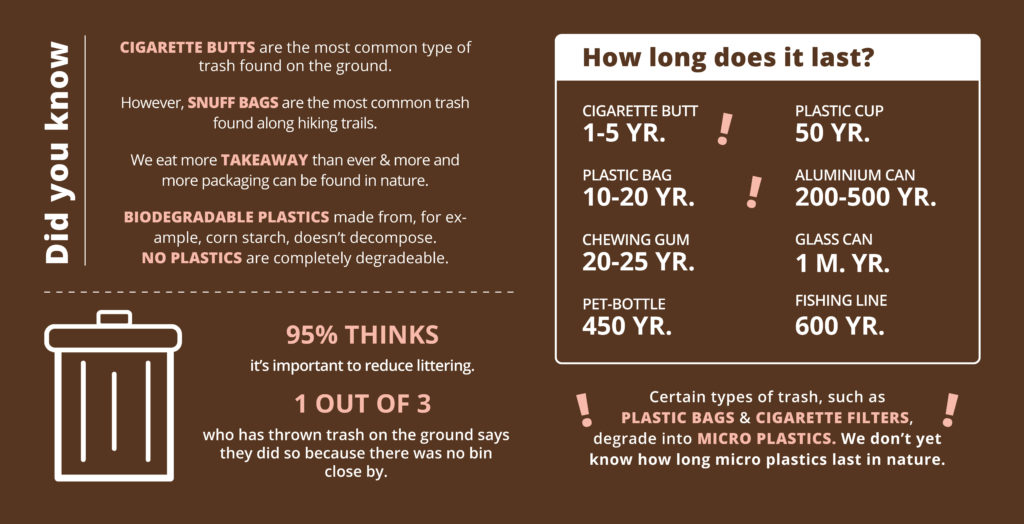
Use without exhausting
The Swedish Right of Public Access Law states that it is as much a responsibility as a right to be outdoors. If we want to be able to continue to have the freedom to visit the outdoors, we need to continue to nurture nature and its resources to ensure that it lasts over time. Nature has a shorter growing season in the mountains than elsewhere. This means that it takes longer to repair the damage created by humans, which risks more permanent damage to the vegetation around hiking trails. Many measures are taken to help us be kinder towards the forests while in the mountains without damaging it. Marked trails and wooden paths are a way to protect sensitive ground from being damaged by e.g., hikers and cyclists. Make sure to walk on them not around them. Sometimes trails are closed. This is usually due to them being badly damaged and needing to be repaired so as not to be permanently destroyed. Choose another trip for the day and respect nature’s recovery process.
Enjoy the mountain flora
Vegetation is also fragile and therefore you should not, for example, pick lichens, break off live twigs or pick flowers you’re unfamiliar with. There is a great chance to see protected plants – for example orchids. Buy a book about mountain flora and learn to recognize the different species. Enjoy them where they stand, where they are most beautiful!
Avoid congestion
When we’re many in the same place, we unconsciously contribute to increased wear and tear on forests and land. Maybe you can find a whole new cloudberry area and create your very own and unique memory? Ask locals and search through maps for new skiing and hiking areas for your excursion. If you come to a parking lot and see that it’s full, be careful where you park so that you don’t block the road for rescue vehicles and other important transports.
Leave the animals in peace
Reindeer, foxes, ptarmigan (grouse), birds of prey, lemmings, lynx, wolverines and moose are just a selection of the animals that you can catch a glimpse of here. It is important to leave them alone and give them the space they need, especially from April to June as this is mating season and many of the animals will give birth to and raise their young during this period.
- Keep your dog leashed at all times. Even the most obedient four-legged friend can react unexpectedly in a new environment. And even the smallest of our beloved mongrels can suddenly imagine that they’re big enough to hunt for deer or moose.
- In mountainous environments, birds often nest on ledges and in shrubbery so try to avoid disturbing them.
- Cubs or young animals that are alone have usually not been abandoned even if it may look that way. The mother is most likely nearby. Therefore, you need to stay well away.
- Feel free to take pictures, but only from a good distance.
- Leave nests, eggs, burrows and other habitats alone. Even if they look empty they might not be and we can disturb its inhabitants if we are not careful.
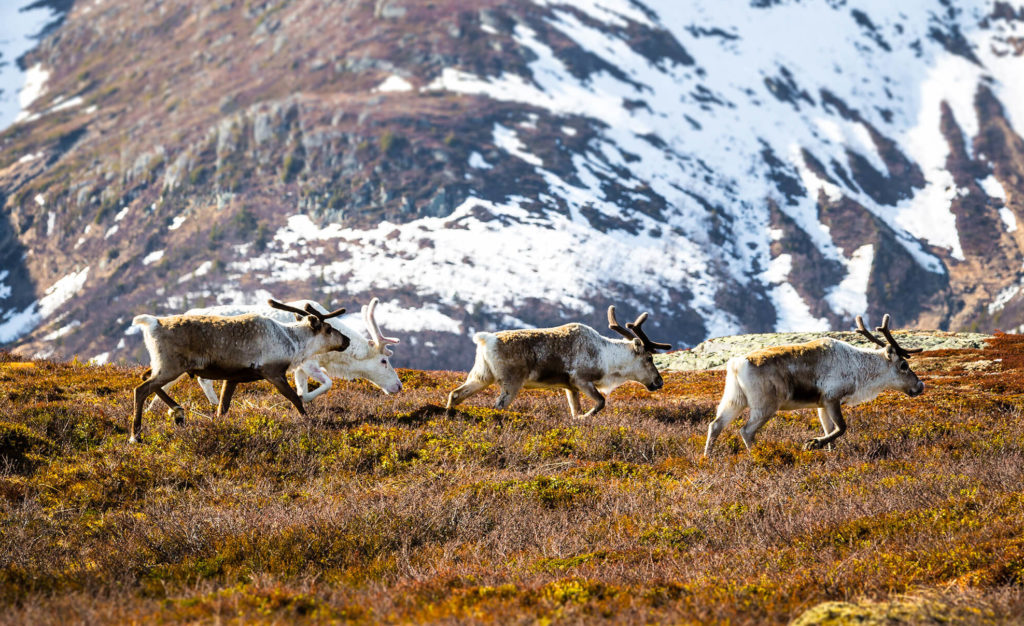
More Tips!
If you find larger amounts of trash in nature, report it to Åre Municipality so that they can take care of it.
Together, we can make a difference for animals and nature. Thank you for your contribution.
Last updated 15 August 2023


